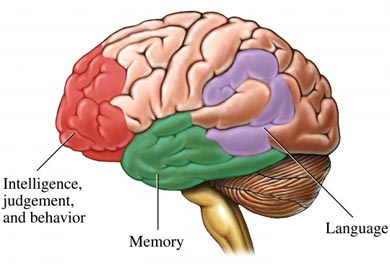Dementia is loss of cognitive ability and disturbance of mental function, due to certain process in brain. This condition often happens to elderly/aged person, but may also as a result of brain injury or other illness. There are many types of dementia, but the most common form of dementia is caused by Alzheimer's disease. Some other dementia types are vascular dementia, Parkinson's dementia, unspecified dementia, etc.
Several medicines have been developed and used as pharmacologic therapy to slow down dementia's progress.
1. Donepezil
Donepezil is an acetylcholinesterase inhibitor, which inhibits the acetylcholinesterase enzyme. This enzyme normally exists to maintain the balance fate of acetylcholine by degrading it into acetyl chain and choline, to be used again as neurotransmitter; thus decreasing acetylcholine concentration. Meanwhile, acetylcholine is necessary for neurotransmission specifically and brain function generally. Since there is significant decrease of acetylcholine concentration in dementia, acetylcholinesterase inhibitor is practically useful in this condition.
The advantage of using donepezil is because this medicine is effective for mild to severe AD, even though this medicine has no effect on disease's course. Recommended dose for donepezil is 5-10 mg once daily for mild-moderate Alzheimer's disease (AD), and 10-23 mg once daily for moderate-severe AD. Several adverse effects are diarrhea, nausea, vomiting, and headache.
2. Rivastigmine
Also an acetylcholinesterase inhibitor, with other effect as butyrylcholinesterase inhibitor. Pharmacological effect is similar with donepezil. Rivastigmine is indicated for mild-moderate AD. This drug is also available as transdermal patch, besides as tablet. Recommended starting dose for rivastigmine is 2 times 1.5 mg per day, usually is titrated to 2 times 3 mg per day, with maximum recommended dose is about 9-9.5 mg/day. Main adverse effects are nausea and vomiting. Its efficacy in mild-moderate AD is similar with donepezil.
3. GalantamineGalantamine is also an acetylcholinesterase inhibitor, which is developed for the first time in Eastern Europe. Besides its indication for mild-moderate AD, this medicine also used as adjunctive therapy in poliomyelitis; nootropic, and several neurologic conditions. Several countries also approve this medicine for vascular dementia. Galantamine brings risk of bradycardia, thus causes more deaths in mild cognitive impaired patients or mild AD [based on case report, Fisher AA. Ann Pharmacother 2008; 42 (2): 278-283]. Recommended starting dose is 2 times 4 mg daily, titrated to maintenance dose as needed. Several common adverse effects are nausea, vomiting, bladder pain, diarrhea, and irritability.
4. Huperzine-AHuperzine A is also an acetylcholinesterase inhibitor, thus it is considerably effective in mild-moderate AD. Its role as NMDA receptor antagonist is still under investigation. First it appears as herbal compounds from the plant Huperzia serrata. Its prodrug form is still in development stage for AD medicine. This medicine is available only in China. Several adverse effects are chest pain, abdominal pain/upset symptoms, and brain hyperactivity.
5. MemantineMemantine is an NMDA receptor antagonist. NMDA, or N-methyl-d-aspartate, is a compound related to glutamate. Normally glutamate enhances memory and cognitive function but when the number of it is getting higher (i.e. in AD), it overstimulates nerve cells and the resultant effect is considerably neurotoxic. So this medicine is different from the others; which is only effective in moderate-severe type of AD. This medicine is newly approved in only several countries for AD, with dose of 5-20 mg daily (end of 2010 until mid-2011).
From our knowledge, there are only five specific medicines which have been approved as dementia therapy, or AD therapy specifically. Amongst donepezil, galantamine, rivastigmine; all of them have similar effectivity against mild-moderate AD. The choice of therapy should based on physician consideration, balanced with patients preferences and family supports.
Your comments are welcome.
References:
Clinical Drug Data 11th edition, 2010
Fisher AA. Ann Pharmacother 2008; 42 (2): 278-283
Informations from www.drugs.com
Santoro A et al. CNS Drugs 2010; 24 (2): 163-76


No comments:
Post a Comment